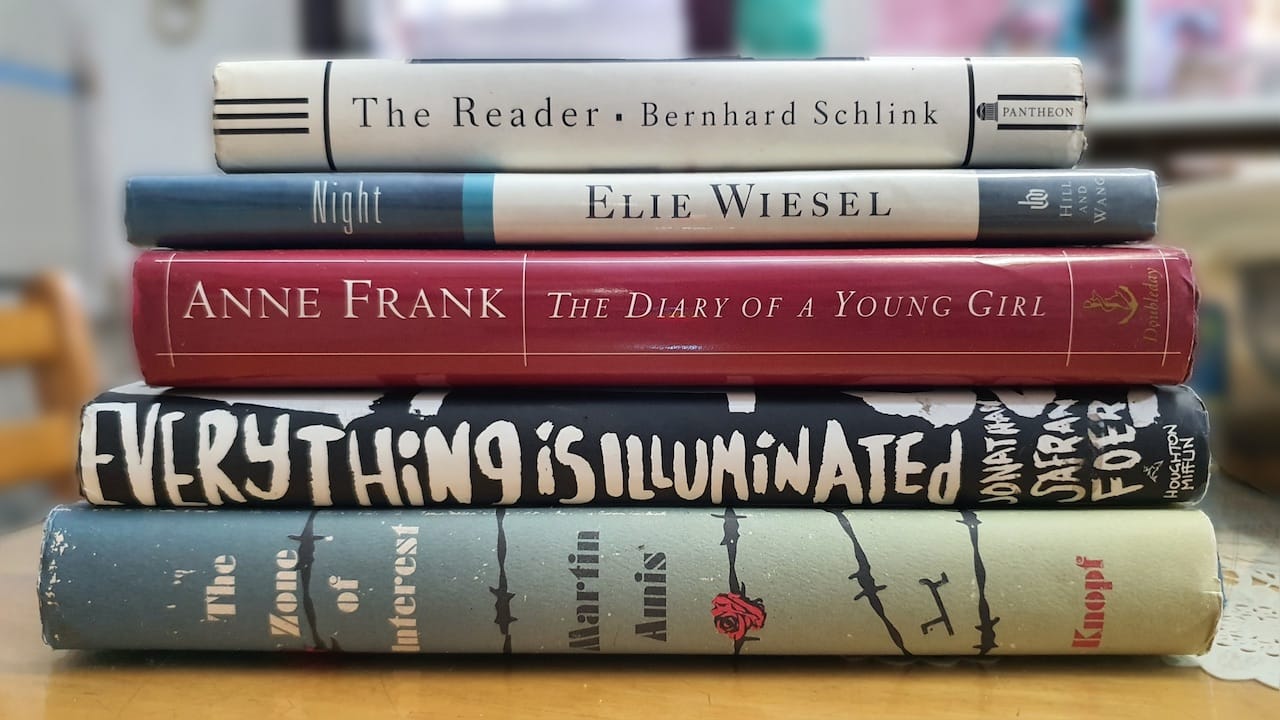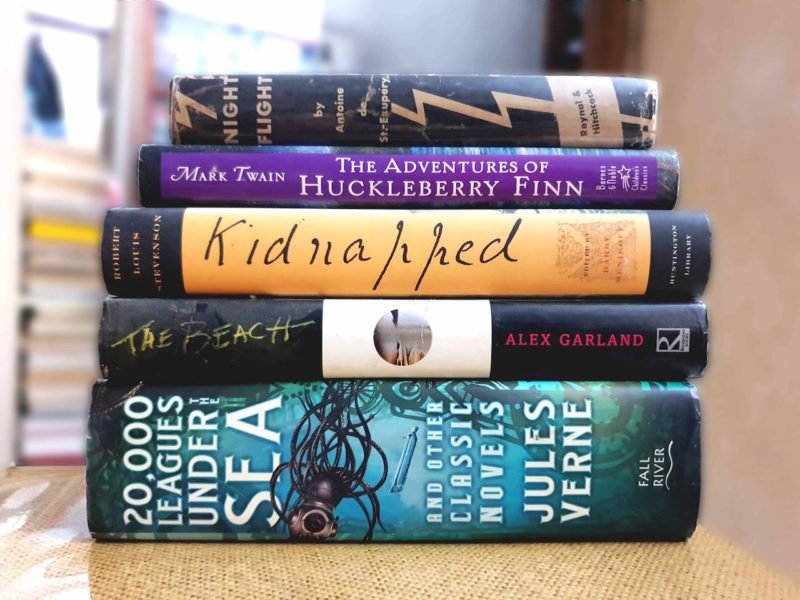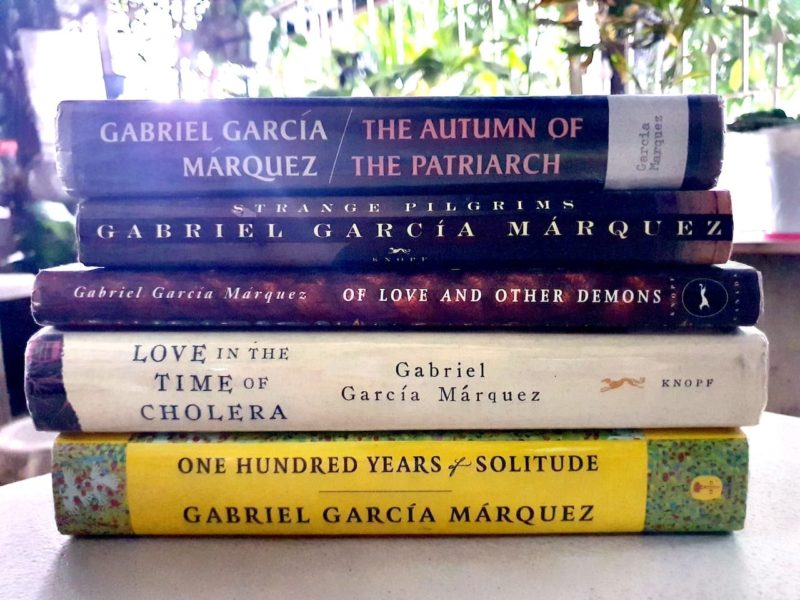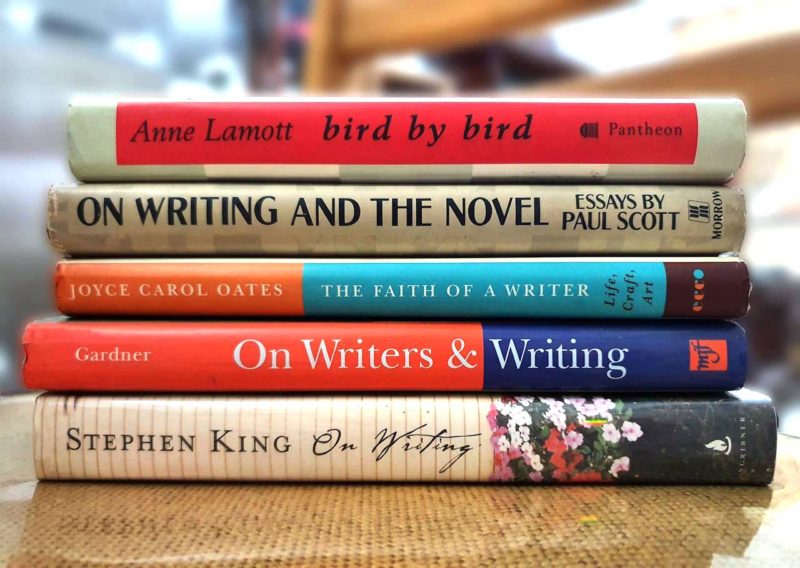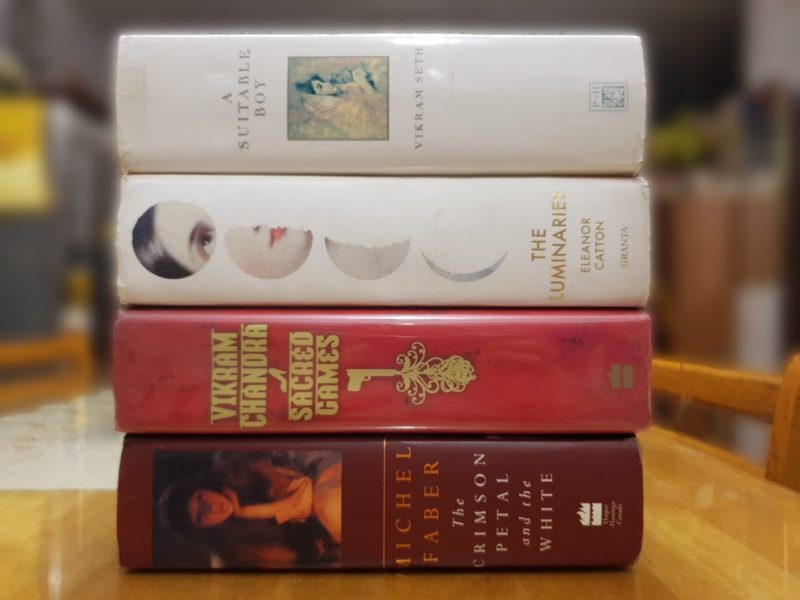[su_label type=”success”]Book Pile[/su_label]
[su_tabs]
[su_tab title=”The Reader”]Originally published in German as Der Vorleser (1995). First published in English by Phoenix House (1997). This edition published by Pantheon Books (1997), translated from the German by Carol Brown Janeway. Hardcover, 218 pages[/su_tab]
[su_tab title=”Night”]Originally published in Yiddish as Un di Velt Hot Geshvign by Central Union of Polish Jews in Argentina (1956). This edition published by Hill and Wang (1960), translated from the French (La Nuit, 1958) by Marion Wiesel. Hardcover, 116 pages[/su_tab]
[su_tab title=”The Diary of a Young Girl”]Originally published in Dutch as Het Achterhuis: Dagboekbrieven 14 Juni 1942 – 1 Augustus 1944 by Contact Publishing (1947). First English translation by Doubleday (1952). This Definitive Edition published by Doubleday (1995), edited by Otto H. Frank and Mirjam Pressler, translated by Susan Massotty. Hardcover, 340 pages[/su_tab]
[su_tab title=”Everything is Illuminated”]Published by Houghton Mifflin (2002). Hardcover, 288 pages[/su_tab]
[su_tab title=”The Zone of Interest”]Originally published by Jonathan Cape (2014). This edition published by Alfred A. Knopf (2014). Hardcover, 320 pages[/su_tab]
[/su_tabs]
The Reader by Bernhard Schlink
This intriguing novel is a story of love and deceits, terror and sympathy, set against the haunted backdrop of postwar Germany. The Reader (1997) by Bernhard Schlink has been hailed for its serpentine sensuality and the ethical demands it makes upon the reader.
The feeling of guilt is portrayed in several ways throughout the book. As Germany rebuilds after WWII, Michael Berg encounters Hanna Schmitz, a former guard at Auschwitz and a bus conductor, but becomes upset when Hanna leaves without warning. Years later, he’s shocked to learn that Hanna is on trial for a Nazi war crime at Heidelberg University.
Night by Elie Wiesel
Night (1960) is a memoir by Elie Wiesel which is about his time in the Nazi German concentration camps of Auschwitz and Buchenwald with his father at the end of World War II in Europe, in 1944 and 1945. In the midst of his recounting, Eliezer pauses to provide a touching comment on the lasting effects of that night, a night that etched the horror of Nazi atrocity into his memory.
Elie Wiesel frequently employs the darkness as a metaphor throughout the novel, and the title alludes to this theme. Every person who suffered in Nazi concentration camps during World War II felt the utter desolation of life, mind, and soul that “Night” represents.
The Diary of a Young Girl by Anne Frank
Anne Frank was a Jewish girl who eluded the Nazis and perished in World War II. The Frank family faced extreme privation for two years while hiding from the Nazis in the Secret Annex at the back of a warehouse. At the time, Anne kept a diary in which she discussed both the horrors of war and the challenges of growing up.
Anne Frank’s astonishing diary has become a world classic since it was discovered in the attic where she spent the last years of her life. It was initially released in 1947 (Dutch: Het Achterhuis. Dagboekbrieven 14 Juni 1942 – 1 Augustus 1944), which was two years after Anne Frank passed away in a concentration camp, and subsequently rose to prominence as an important piece of war literature. Anne and her sister Margot were moved from Auschwitz to Bergen-Belsen on November 1, 1944, where they both eventually perished (likely from typhus).
Everything is Illuminated by Jonathan Safran Foer
A young man, also named Jonathan Safran Foer, goes out to find the woman who might have saved his grandfather from the Nazis, armed only with a faded photograph. In order to find out more about what happened to his grandfather during World War II, Jonathan journeys to the center of the Ukraine with Alex, a local who appreciates rap music.
In Everything Is Illuminated (2002), Jonathan Safran Foer recounts the story of a man’s quest to the Ukraine to find the woman he believes saved his grandfather during World War II. Despite his disappointment at not meeting the woman he seeks, his interactions with the various people he has met on his journey have taught him valuable lessons.
The Zone of Interest by Martin Amis
The Zone of Interest (2014), which depicts the tragedy of Auschwitz from the perspectives of two Nazis and a Jew, revisits the Holocaust topic addressed in Time’s Arrow by Martin Amis in 1991. The story is set in the concentration camps and focuses on a Nazi officer who develops affections for the commandant’s wife.
The novel switches between three different narrators: Doll, the camp commandant; Thomsen, a manager in charge of the camp’s labor force and the manufacture of synthetic rubber; and Szmul, the leader of the Sonderkommando, the group of inmates assigned to dispose of the remains.
Further Reading
Can a work of fiction about the Holocaust be inaccurate? by Patrick Freyne, The Irish Times
Why is Holocaust fiction still so popular? by Emily Burack, The Times of Israel
On the Future of the Holocaust Novel by Bram Presser, Jewish Book Council
Holocaust Fiction by United States Holocaust Memorial Museum

